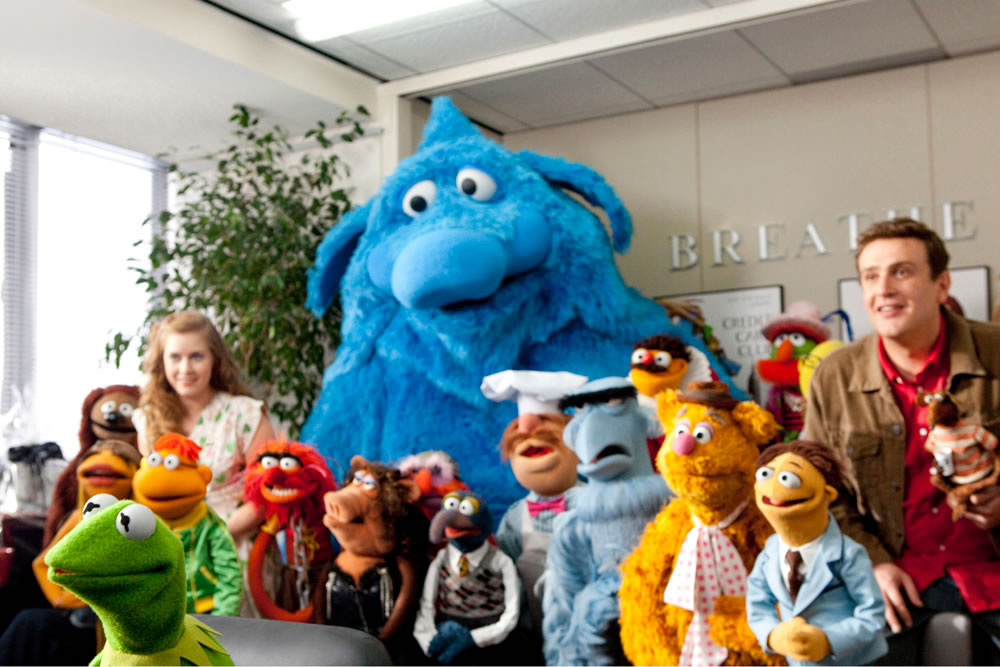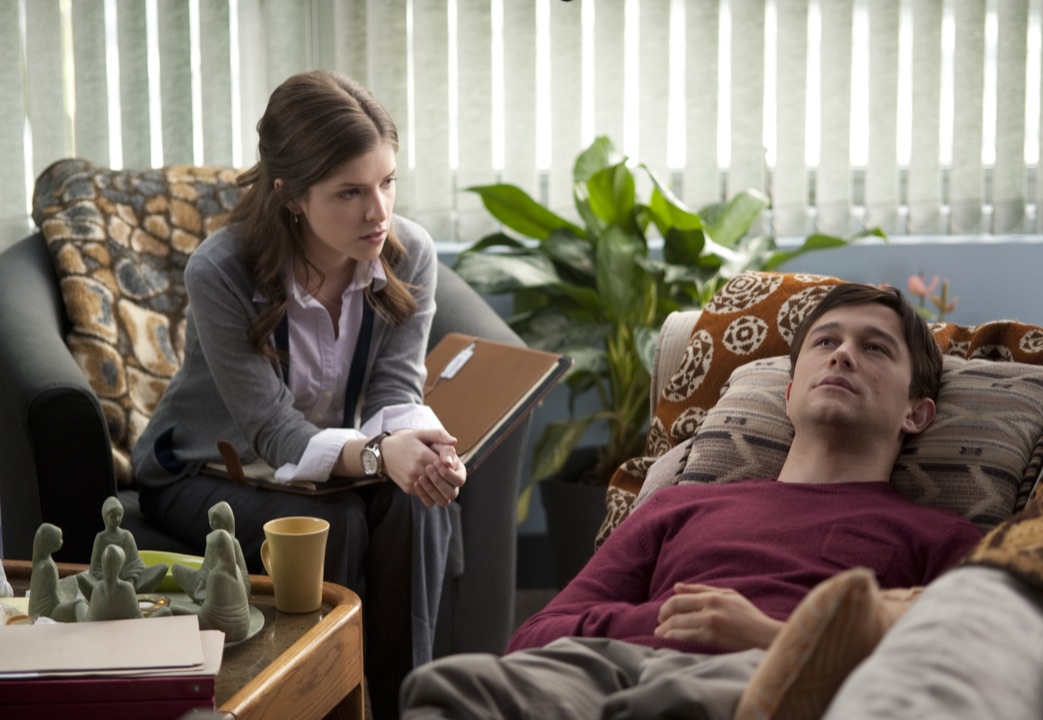I was pretty excited about The Muppets' DVD release, for several reasons. First, critics loved the movie, which earned a 96% score on Rotten Tomatoes, making it the second most critically acclaimed wide release of 2011. Second, I had never had any contact with the Muppets before (except for the Mahna Manha video on Youtube), and everyone loves the muppets, and I really wanted to know why. Third, it's a musical, and I'm one of those strange people who actually like musicals. For such reasons, I went and watched it as soon as it became avaliable in stores, and I wasn't disappointed. It was, possibly, the bast family film of the year.
It opens in style: a fun musical number at the fictional city of Smalltown, in which Gary (Jason Segel) and his brother, the man-muppet Walter (voiced by Peter Linz), live. Gary is a huge fan of the Muppets and doesn't hide his excitement over an upcoming trip to Los Angeles with his brother and sister-in-law Mary (Amy Adams), during which he intends to visit their studio. There, a disappointment: the place is falling to pieces, the Muppets are no longer there and you can count the visitors on one hand. In the wrong place at the wrong time, Walter ends up witnessing Statler and Waldorf selling the Muppets' theater to oil tycoon Tex Richman (Chris Cooper), who, once alone with his henchmen Bobo and Uncle Deadly (also Muppets!), reveals his intention to bring it all down to dig for oil. There is a loophole in the contract, of course: if the Muppets manage to raise 10 million dollars within two weeks, the theater will be theirs again. Desperate, Walter insists to go after Kermit the Frog and they end up deciding to get all the Muppets back together to host a telethon and try to raise the money.
In the process, it becomes clear that the movie possesses many of the characteristics that made the Muppets so popular: with help from Kermit's hysterical butler, the "'80s Robot," they go after each Muppet, starting with Fozzie Bear, who's now working as the lead singer in a Muppets cover band, the "Moopets." All the former members of The Muppet Show have moved on; however, the collective nostalgia and the esteem they hold for the theater (and for what it meant in their lives, one concludes) brings them all together, and, at the end of a montage filled with references to the characters' past, they are all inside the same car, heading to Paris ("by map," in one of the many hard-to-explain jokes that populate the hilarious script) to try and persuade the sassy Miss Piggy, now a plus-size editor of Parisian Vogue, to join them. She refuses to; her life is great, she promised herself not to look back, and she still hasn't forgiven her ex, Kermit, for something unclear (as far as it can be understood, he bailed on their engagement years ago). It doesn't matter: in her place comes Miss Poggy, her mannish "Moopet" version. The Muppets move forward with the idea, and after a series of noes from leading networks -- nobody cares about the Muppets anymore, says the executive played by Rashida Jones --, they end up getting a slot in the schedule of the fictional CDE thanks to the unexpected cancellation of popular show Punch Teacher (one of the movie's many satiric jabs). But there's one condition: they must come up with a special guest star.
With the conflict established, the movie becomes what it's poised to be: nothing but laughs. Everything you can expect from a good Muppet movie is there: the countless, super funny cameos -- Emily Blunt, Mickey Rooney, Sarah Silverman, Zach Galifianakis, Alan Arkin, Kristen Schaal, Neil Patrick Harris, Whoopi Goldberg, Selena Gomez, Jim Parsons and Ken Jeong, to name a few --; the great songs, written by Flight of the Conchords' co-creator and co-star Bret McKenzie; reboots of classic songs like Rainbow Connection and Mahna Mahna; witty self-references (younger guest actors don't know who the Muppets are) and large, very welcome doses of meta-humor (i.e., when a character says something like "Wow, that was such an expensive looking explosion! I can't believe we had that in the budget!"). There is even a point where an amusing Jack Black appears as himself, kidnapped and forced to be the show's "special guest star." It is interesting, too, to notice how the movie strives to be offbeat; unlike others of its kind, this one has characters recognize they have just taken part in musical numbers.
Laughs aside, though, The Muppets' greatest merit is in the fact that it never goes the easy route, as is common practice in comedies and family films these days. The characters are tridimensional, they have conflicts -- granted, superficial ones at that, but then again it's a Muppet movie -- and we can relate to them, to an extent: Mary is upset that Gary still hasn't proposed to her after ten years (!) together; both Gary and Walter, at a certain point, go through identity crisis and can't figure out whether they're men or muppets (the song where this existential conflict is resolved won the movie's sole Oscar, the only one ever won by a Muppet movie); villain Tex Richman's sidekicks are also Muppets and end up conflicted about betraying their own, and so on. In short: it's a good movie, even setting aside the nostalgic, humorous references that ought to delight longtime fans. The cast is sharp and the cameos complement it superbly. The pacing is great, with laughs all throughout. There is a good message (albeit one some labeled as communist) for the younger kids. Add to that the fact that we're dealing with the MUPPETS, and it becomes impossible not to like the movie. Congratulations to actor/screenwriter/fan Jason Segel, who took the initiative to make a movie with Jim Henson's creations over a decade after they had last hit the big screen. Thanks to said initiative, we can now safely profess that the Muppets are back.
Final Rating:
Academy Awards: Best Original Song, "Man or Muppet"


